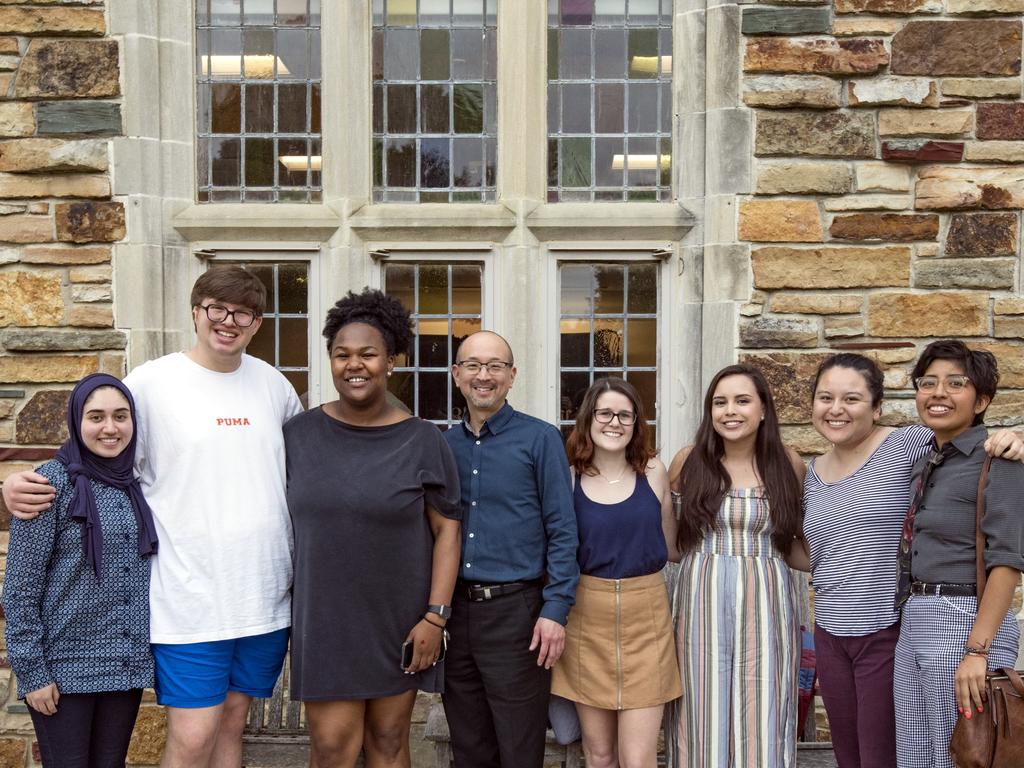“Why are we here? Why are we learning this?’’ These are questions educators should be asking students every day, said Dr. Kevin Kumashiro to a packed room in Rhodes College’s Briggs Hall on June 20. “If you can’t answer, or if you’re buying into someone else’s version of why or what the answer should be, then are we really teaching people to think?”
Kumashiro is a nationally recognized expert on educational policy, school reform, teacher preparation, and educational equity. Visiting Rhodes for the second time, Kumashiro is the scholar-in-residence for the Educational Studies program’s inaugural Urban Education Summer Institute.
Using stories and examples from his experiences in and out of the classroom, he presented five lenses—framed as questions—to think about today’s complex educational, social, and political landscape: Why are we here? How did we get here? How are we defining the problem? How are we defining solutions? And, how shall we educate for democracy?
“Hopefully they will be helpful as we think about how we understand the moment that we’re in,” he said.
Retired educator and lifelong learner Dr. Yvonne Robinson Jones was among those who attended Kumashiro’s lecture. “I am very interested in what is happening in urban education, and I have taught on all levels and at different schools in the Memphis community,” she said. “Hearing that a four-year college is beginning to see that there is more teacher preparation needed, and then providing that preparation right on site for people to come and receive advanced degrees in education and urban studies, is really great, because the situation in America is a very diverse one, a very complex one. It is in most instances about giving children opportunities, giving them the caring and sharing and sense of confidence they need, no matter how small they are, and having the right people with the right skills and the right attitude wanting to see them do well and advance.”
Rhodes rolled out its Master of Arts in urban education degree this summer, offering courses on the foundations of urban education, educational statistics, educational technologies, and curriculum and instruction in urban schools. This new degree will build on the college’s educational studies major, which obtained a state-approved licensure component (both elementary and secondary) in 2016. Students in the urban education master’s program will complete a semester of student teaching and will earn initial licensure in one of 20 elementary and secondary endorsement areas.
According to Dr. Natalie Person, the program chair, “The state Department of Education requires that each teacher preparation program has a primary partner. Rhodes is partnering with Shelby County Schools, which is the largest district in the state and has a demand for highly-qualified teachers.”
During his Rhodes visit, Kumashiro will speak to the master’s degree candidates in their classes on his book Bad Teacher! How Blaming Teachers Distorts the Bigger Picture, in which he takes aim at the debate on educational reform, paying particular attention to the ways that scapegoating public school teachers, teacher unions, and teacher educators masks the real, systemic problems.
Participants in the new Urban Education Fellows program also will spend time engaging with Kumashiro. These students are Rhodes undergraduates who work with faculty and local teachers on curriculum and research projects, as well as serve the local nonprofit organizations Literacy Mid-South, Summer Success Camp, Whole Child Strategies, Facing History and Ourselves, and Latino Memphis.
Katherine Bryant ’20 is working with Whole Child Strategies, Inc. this summer to help develop literacy and mentoring programs between the elementary schools they partner with and Rhodes. “I chose to apply for the Urban Education Fellowship because I am genuinely passionate about education, and about finding solutions tailored towards a diverse and ever-changing population. Having this opportunity will help broaden my knowledge on prevalent issues facing our community and the education system today.”
Kumashiro ended his talk by encouraging the audience to question how success is defined and to get their students to ask more questions. “Let’s rattle the concepts of success, democracy, and education. Let’s rattle what has become the common sense of our times, and let’s see if that invites us to create an education system that more creatively advances democracy and social justice for all.”
